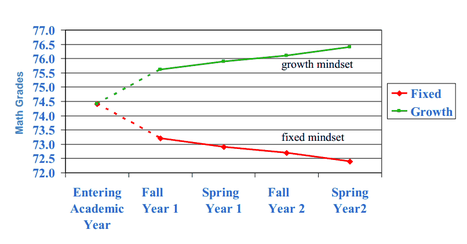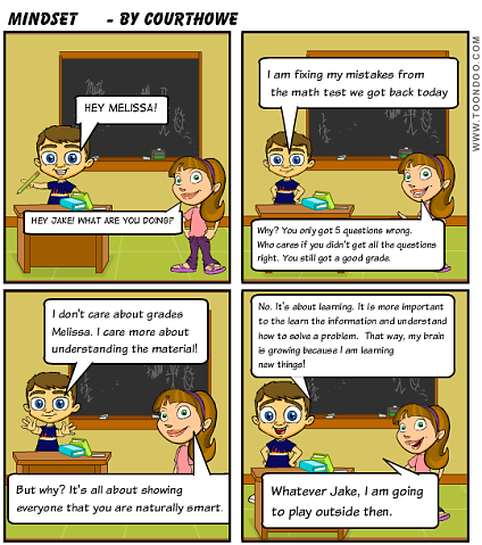What is Mindset?
Mindset research has been a very important factor in education over the last 30 or so years. Mindset involves learning what type of intelligence an individual possesses. It also determines the type of personality and traits a person holds. Mindset research very important to understand because it helps teachers and parents understand the motivation level a person/student has. What are their attitudes towards learning? Do they enjoy tackling challenges, or do they prefer to just coast through school doing the minimum amount of work possible? Since mindset research is such a buzzed about topic in education, I feel very adamant to devote a page discussing it. Mindsets impact people on how they operate on a day-to-day basis. The best way to help students in school is to understand the type of mindset they have so we can help them grow and achieve success.
There are two types of mindsets. The first is a fixed mindset where individuals believe they were born with a specific intelligence level and they cannot get any smarter than they already are. They are people who are afraid of a challenge because they care more on what people think of them. They don’t want to solve a problem unless they are guaranteed to get it right.
The second mindset is called a growth mindset. Individuals know that intelligence can be developed over time and that the brain can keep growing. They love challenges because it shows them that they are learning. They care more about learning and understanding material as opposed to their grades. A bad grade just motivates them to work even harder to get it right. They embrace feedback from others to guide them in the learning process because it shows them that their brain is growing with valuable information.
There are two types of mindsets. The first is a fixed mindset where individuals believe they were born with a specific intelligence level and they cannot get any smarter than they already are. They are people who are afraid of a challenge because they care more on what people think of them. They don’t want to solve a problem unless they are guaranteed to get it right.
The second mindset is called a growth mindset. Individuals know that intelligence can be developed over time and that the brain can keep growing. They love challenges because it shows them that they are learning. They care more about learning and understanding material as opposed to their grades. A bad grade just motivates them to work even harder to get it right. They embrace feedback from others to guide them in the learning process because it shows them that their brain is growing with valuable information.
Mindset statistics in school!

There are many articles with research and statistics that state that students with a growth mindset have an increased motivation level towards school, receive better grades and have higher achievement test scores. In a study by Joshua Aronson and Catherine Good, they also reported “students were taught that their brains form new connections every time they learn, and that over time they can become smarter”. When students were told this, they were very excited to hear that they have a lot of influence over their brain and through hard work and motivation, they can become even smarter. As shown in the graph to the right, students with a growth mindset received much higher grades in math than students with a fixed mindset.
Another interesting statistic that can promote a growth or fixed mindset is based on the type of praise students are given. It is best for teachers and parents to praise a student’s effort as opposed to their intelligence based on the grade they receive. As stated in an article by Dweck, “it was praising the students process- which could be their effort, strategies, concentration, choices, persistence- that helped them remain motivated, confident and effective” (2006, p.2). Students who were praised for their grade and intelligence level were less likely to tackle challenges and instead, choose to solve the easier problems they knew they would get right.
Another interesting statistic that can promote a growth or fixed mindset is based on the type of praise students are given. It is best for teachers and parents to praise a student’s effort as opposed to their intelligence based on the grade they receive. As stated in an article by Dweck, “it was praising the students process- which could be their effort, strategies, concentration, choices, persistence- that helped them remain motivated, confident and effective” (2006, p.2). Students who were praised for their grade and intelligence level were less likely to tackle challenges and instead, choose to solve the easier problems they knew they would get right.

Some Questions to Ponder:
Based on the the cartoon diagram to the right, what type of mindset does Jake have? What traits does Jake have that make him have that type of mindset?
What type of mindset does Melissa have? What traits make her have that mindset?
MIndset article
Parents and students! I highly recommend you to read this article posted below. It is a great source to help you understand the different types of mindsets and how a persons brain works. When you are done, please take the polls below to see how well you understand mindsets.
| brainology_article.pdf | |
| File Size: | 355 kb |
| File Type: | |
